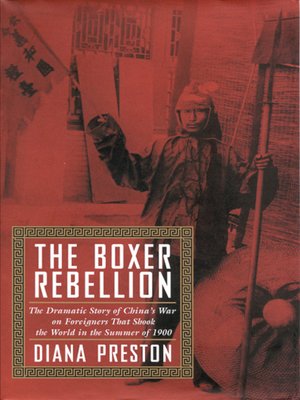
Sign up to save your library
With an OverDrive account, you can save your favorite libraries for at-a-glance information about availability. Find out more about OverDrive accounts.
Find this title in Libby, the library reading app by OverDrive.



Search for a digital library with this title
Title found at these libraries:
| Loading... |
In the final years of the nineteenth century, China was in grave danger of becoming a colony of the West. While various powers bickered over how to slice the pie, their very presence in China, like their new technologies and Christian missions, undermined the people’s traditional ways. In response, a strange, reactionary movement—mystical, militaristic, and virulently anti-Christian—began to spread like wildfire among the Chinese peasants. The contemptuous foreigners, snickering at their martial-arts routines, nicknamed them “the Boxers,” never imagined that this seemingly small group would receive official backing from China’s empress dowager, herself eager for a showdown with the foreigners, and would soon terrorize them around the world.
The Boxer Rebellion is a panoramic chronicle of the Boxer uprising and ensuing siege of the foreign ministries in Peking and Tientsin during the summer of 1900—an event whose repercussions have echoed throughout the intervening one hundred years. It left tens of thousands of Chinese dead, precipitated the end of dynastic rule in China, and has tainted China’s relationship with the wider world to this day. It was also a richly human story.
Relying on the diaries, letters, and memoirs of the defenders, and on her own extensive research from both Chinese and Western perspectives, Diana Preston portrays the dramatic human experience of the Boxer uprising in the diplomatic district of Peking, cut off from the outside world during the desperate weeks of the siege; behind the Byzantine walls of Peking’s Inner City, where decisions were made that forever changed the face of Chinese society; among the allied relief forces struggling to lift the siege; in the aftermath when the great city was looted and despoiled. Here is young Herbert Hoover, then a mining engineer, patrolling the barricades of Tientsin at night on bicycle; British admiral Sir Edward Seymour, whose aborted rescue mission became itself a survival storyl the French bishop Favier, whose successful defense of Peking’s Peitang Cathedral was nothing short of a Christian miracle; and Tzu His, the fabled empress dowager who had held power for nearly forty years, fighting to preserve a dynastic way of life that had lasted for centuries.






